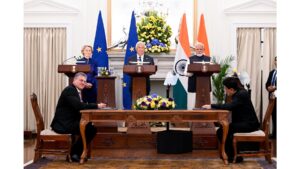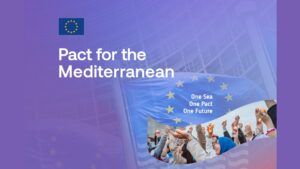The 25th summit of the Shanghai Cooperation Organization (SCO) results in long-term implications for the EU
Recently, the 25th summit of the Shanghai Cooperation Organization (SCO) was hosted in Tianjin by the presidency holder China. The primary official goal of the organization is to promote political, trade, economic, scientific, and technological cooperation among member states. Additionally, it aimed to contribute to ensuring and maintaining regional peace, security, and stability, and advance a new, democratic, fair international political and economic order. In other words, it can be seen as primarily a security-oriented organization aimed at countering Western influence.
The SCO was founded in 2001 by China, Kazakhstan, Kyrgyzstan, Russia, Tajikistan, and Uzbekistan. The organization expanded in June 2017 to include India and Pakistan. Later, in 2023, Iran joined, and in 2024, Belarus became a member. Afghanistan and Mongolia participate as observers, and numerous other predominantly Asian and Middle Eastern countries are involved as dialogue partners in the discussions.
The countries participating to varying degrees in this cooperation are currently forming the world’s largest regional organization, covering 65% of the Eurasian continent and 42% of the world’s population. The world’s most populous countries, such as India, Indonesia, and Pakistan, attended this year’s summit. The significance of the event is underscored by the presence of the UN Secretary-General and the Secretary-General of the Association of Southeast Asian Nations (ASEAN).
Although it was founded 25 years ago, the organization’s goals, cooperation structures, and platforms have not undergone significant development, similar to the BRICS+ alliance. What makes this summit particularly relevant from the EU’s perspective is, firstly, the participation of India’s Prime Minister, and secondly, the long-term impact of the announced measures.
The Triumvirate of China, Russia, and India?
Trade relations between India and China have always been significant; China remains one of India’s most important trading partners. However, the political and military relations between the two major powers have been tense for decades, with relatively frequent border clashes. Therefore, it is not surprising that, despite cooperation within the BRICS+ group, Indian Prime Minister Narendra Modi has not visited China in seven years. Yet, the two rival powers have recently begun to strengthen their cooperation, primarily due to measures taken by President Trump.
Firstly, the Trump administration sought to renegotiate trade agreements with most countries around the world. In the absence of an agreement with India, the US introduced a 25% “reciprocal” tariff on India, which came into effect at the end of August. Second, as part of efforts to end the Russia-Ukraine war, President Trump imposed secondary sanctions on India for the continued purchase of Russian oil. According to data from the Finnish Energy and Clean Air Research Center (CREA), some sources report that in 2021, India’s largest oil refiner, Jamnagar, imported only about 3% of its total crude oil from Russia. Since the Russian-Ukrainian military conflict, this proportion has increased to an average of 50% by 2025. Remarkably, according to CREA, over 40% of the large volumes of refined oil were purchased by the EU.
In summary, the Asian country faces a 50% tariff on exports to the US market. This measure has a severe impacton India, which has historically relied heavily on the US as its most important export market. Considering the Modi government’s plans to increase the manufacturing sector’s share from 12% to 23% over the next two decades, aiming to create jobs and stimulate economic growth, losing such a significant market creates a challenging situation for the Indian government. In line with its historical neutrality, India has decided not to yield to American pressure. In response, it has strengthened its ties with Russia and China, evidenced recently by the Prime Minister’s personal participation in the SCO summit.
The ties between Russia and China have been strong for the past four decades. Since the 2022 Russia-Ukraine war has intensified, with a declaration of “no limits” friendship. The declaration was followed by several visits of the two heads of state, which all resulted in similar, eloquent enunciations of political cooperation. However, no clearly binding measures were accepted, which offered ambiguity to the leaders and made the alliance more personal. Even without treaties, the Sino-Russian alliance seems natural: China is a manufacturing powerhouse and a technology leader; Russia needs these goods and technologies, while being a major exporter of energy sources that are essential for producing these goods. The alliance is likely to be strengthened by India’s openness to Russian oil and its vast service sector, making an important trading partner for both China and Russia.
The summit did not end with a joint statement, but President Xi Jinping’s words and upcoming measures are revealing. Xi announced initial plans to create a development bank managed by the organization, as well as a cooperation platform for green and energy industries. Over the next three years, the organization promises to provide $1.4 billion in loans to member countries. Regarding security cooperation, the organization will enable SCO member states to use China’s BeiDou satellite system as an alternative to the US-controlled GPS. These measures are particularly beneficial for Russia, which can expect to receive financial and technological support within the organization’s framework. In essence, the SCO’s previously loose cooperation system is being significantly strengthened, with some financial resources made available.
What does all this mean for the EU?
The fact that India has virtually lost its largest export market could open opportunities for the EU to establish closer trade relations with one of the world’s most dynamically growing countries. At the same time, if the economies of Russia, China, and India within the SCO and BRICS+ framework become more integrated—particularly in the energy sector—this could increase concerns about energy security for the EU, which relies on more expensive energy sources. The lack of affordable energy resources is likely to erode the EU’s competitiveness further.
One of the primary beneficiaries of this cooperation is expected to be China, which could compete with the EU on infrastructure projects financed by China, such as the Belt and Road Initiative (BRI), especially in Central Asia and Eastern Europe. As a result, the EU’s geopolitical influence is likely to continue to diminish.
Due to the strengthening of the “Global South,” it is conceivable that member states will act more unified in foreign policy matters. This will likely make it even more difficult for the EU to manage international conflicts and achieve its own foreign policy goals. Consequently, SCO member states could form a counterweight to the influence of the EU and the USA in global politics. All of this is expected to increase geopolitical tensions between the rival blocs.






